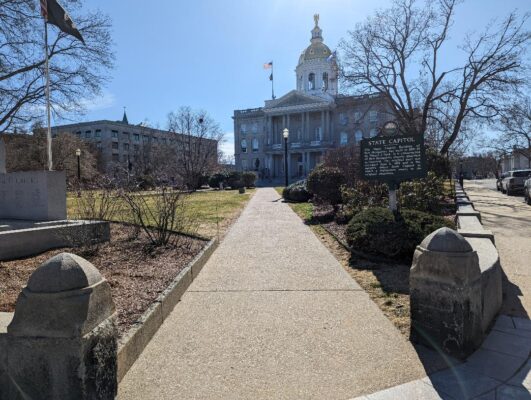This week, we met in session for what should have been a short day. We started by agreeing with minor Senate amendments to four bills and a not-so-minor amendment to HB 252, which exempts agriculture from municipal noise ordinances.
We want to thank NH State Rep Carol McGuire for this Op-Ed. Please submit yours to Editor@GraniteGrok.com.
The Senate deleted “agritourism,” which had been debated in the House but narrowly (176-164) kept in the bill. Twenty-five non-controversial bills, including two from my committee, were voted on at once. Then we got to the debates…
SB 128, payment for legal services when facing an involuntary commitment, was debated on the committee amendment, which allowed the state to require reimbursement for these services from those who could afford it. Sounds obvious to me – and to most Republicans; the Democrats insisted that a person in a mental health crisis couldn’t manage to pay. Probably true, but reimbursing the state later should be no problem for those who could afford it – and we heard the average charge was only a few hundred dollars. Nonetheless, the amendment was defeated, 182-201, and the bill passed 207-177.
SB 258, disposal of highway real estate, was killed without comment since it was an attempt to get one specific piece of land transferred to a nonprofit group at less than market value. SB 164, adding “biodiversity” to the process of approving LCHIP (land and community heritage investment program) grants, was tabled without debate since it wasn’t able to define biodiversity in a satisfactory way.
SB 120, regulations for charitable gaming, was debated on only one issue: increasing the maximum single bet to $50. The opposition seemed convinced that every bet would be that high, despite testimony that the average bet was $5 or less. The bill passed 202-182.
SB 272, the parental bill of rights, finished off the morning. Six-floor amendments that weakened parents’ rights were debated and passed, with one or two Republicans voting with all the Democrats. The problem was that seven Republicans were absent and only three Democrats, so they had a majority for the day. The bill was not tabled, 186-199, and then the minority leader moved for indefinite postponement, which passed 195-190. The indefinite postponement means that not only does this bill die, but no similar bill can be considered until after the next election. This is very discouraging, as the bill not only clarified all parental rights in education but required teachers and school personnel to answer their questions honestly, even if it involved gender issues. Some school districts – famously Manchester’s (they’re in a lawsuit about it) – have explicit policies that allow school employees to hide children’s gender explorations from their parents in the guise of protecting them from abuse.
SB 267, requiring environmental rules to consider “cumulative impacts analysis,” passed without debate, 302-77. I was opposed because it seems to be giving the department excessive authority to set policy.
SB195, from my committee, was a clarification of what steel products require Buy American certification. We had approved it unanimously, but a sharp-eyed representative read the bill and noticed that a line was missing between the bottom of page one and the top of page two… so we prepared a floor amendment, I spoke on why it was needed, and the amendment and the bill passed on voice votes.
SB 32, on the opioid abatement fund, was mostly language updating and cleanup; a new section on undefined “harm reduction” was included, and we debated the minority amendment. It replaced that reason for grants from the fund with specific authorization for checking street drugs for contaminants, which is a common problem. The amendment failed, 152-230, and the bill passed on a voice vote. SB 85, on emergency behavioral health programs, was debated on whether it was well enough defined to actually work or whether it was an undefined mandate for various mental health and substance abuse interventions. It was not killed, 159-223, then passed, 271-112. Since it mostly dealt with payment for these treatments, it went to the Commerce Committee for review.
SB 127, a long list of minor updates to Health & Human Services programs, passed without discussion. SB 200, slightly expanding the scope of practice for optometrists and allowing them to administer a few specific vaccines (flu, shingles, Covid), was debated on the minority amendment, which excluded various types of Covid vaccines. I thought the specific prohibitions were excessive and voted against this amendment, which failed 105-275. The bill passed 239-141. SB 239, on harm reduction services to treat substance abuse, had a committee amendment adopted, 249-127, then we debated a floor amendment defining “misuse,” which passed 359-18. After that, the bill passed on a voice vote.
SB 263, permanently authorizing the “Granite Advantage” expanded Medicaid program, took the rest of the day. This was favored by all Democrats and a few Republicans, which meant the rest of us couldn’t stop it. We considered 27-floor amendments to the bill. The most important one came first, giving the program a six-year sunset. This would allow a five-year contract after the current one ran out and so allow it to expire naturally. No luck; it failed, 184-192. After six more amendments, the Democrats moved to limit debate – which would allow the remaining motions to be made and voted, with no speeches, just the short “parliamentary inquiries” that we use to remind people how to vote. This passed 196-169, and so there were no explanations of what was being considered. It didn’t really matter: they voted no on all amendments and made the same parliamentary inquiries (by the same representative!) on nearly all of them. At the end, the bill passed 193-166 and was sent to Finance—a very discouraging debate, if one can call it that.
Representative Carol McGuire
carol@mcguire4house.com

